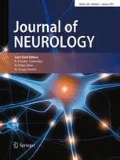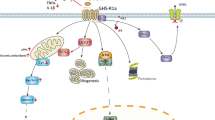Abstract
Ghrelin, an orexigenic peptide, has multiple functions, which include promoting gastrointestinal motility and influencing higher brain functions. Experimental data suggest that ghrelin has neuroprotective potential in the MPTP mouse model of Parkinson’s disease (PD). PD patients show delayed gastric emptying and other symptoms that may relate to disturbed excretion of ghrelin. No data are available on postprandial ghrelin response in patients with PD and idiopathic REM sleep behaviour disorder (iRBD)––a condition considered a putative preclinical stage of PD. We measured fasting and postprandial ghrelin serum concentrations in 20 healthy controls, 39 (including 19 drug-naïve) PD patients and 11 iRBD patients using a commercial radioimmunoassay for total ghrelin. For statistical analysis we employed ANCOVA and post-hoc testing with Bonferroni’s method. Controls showed a decrease of mean fasting ghrelin serum concentrations in the early postprandial phase, followed by a recuperation starting 60 min after the test meal and reaching a maximum at 300 min. This recuperation was less pronounced in PD and iRBD; the slope of relative postprandial ghrelin recovery was different between the investigated groups (p = 0.007). Post-hoc testing showed a difference between controls and PD patients (p = 0.002) and between controls and iRBD patients (p = 0.037). The dynamic regulation of ghrelin in response to food intake is partially impaired in subjects at putative preclinical (iRBD) and clinical stages of PD. Reduced ghrelin excretion might increase the vulnerability of nigrostriatal dopaminergic neurons as suggested by animal studies. The impaired ghrelin excretion might qualify as a peripheral biomarker and be of diagnostic or therapeutic value.

Similar content being viewed by others
References
Abizaid A, Liu ZW, Andrews ZB, Shanabrough M, Borok E, Elsworth JD, Roth RH, Sleeman MW, Picciotto MR, Tschop MH, Gao XB, Horvath TL (2006) Ghrelin modulates the activity and synaptic input organization of midbrain dopamine neurons while promoting appetite. J Clin Invest 116:3229–3239
Andrews ZB, Erion D, Beiler R, Liu ZW, Abizaid A, Zigman J, Elsworth JD, Savitt JM, DiMarchi R, Tschoep M, Roth RH, Gao XB, Horvath TL (2009) Ghrelin promotes and protects nigrostriatal dopamine function via a UCP2-dependent mitochondrial mechanism. J Neurosci 29:14057–14065
ASDA (2005) The International Classification of Sleep Disorders, 2nd edition. Diagnostic and coding manual. American Sleep Disorders Association, Chicago
Blom WA, de Graaf C, Lluch A, Stafleu A, Schaafsma G, Hendriks HF (2009) Postprandial ghrelin responses are associated with the intermeal interval in time-blinded normal weight men, but not in obese men. Physiol Behav 96:742–748
Braak H, Del Tredici K, Rub U, de Vos RA, Jansen Steur EN, Braak E (2003) Staging of brain pathology related to sporadic Parkinson’s disease. Neurobiol Aging 24:197–211
Braak H, Ghebremedhin E, Rub U, Bratzke H, Del Tredici K (2004) Stages in the development of Parkinson’s disease-related pathology. Cell Tissue Res 318:121–134
Carlson JJ, Turpin AA, Wiebke G, Hunt SC, Adams TD (2009) Pre- and post- prandial appetite hormone levels in normal weight and severely obese women. Nutr Metab (Lond) 6:32
Ejskjaer N, Vestergaard ET, Hellstrom PM, Gormsen LC, Madsbad S, Madsen JL, Jensen TA, Pezzullo JC, Christiansen JS, Shaughnessy L, Kosutic G (2009) Ghrelin receptor agonist (TZP-101) accelerates gastric emptying in adults with diabetes and symptomatic gastroparesis. Aliment Pharmacol Ther 29:1179–1187
Gibb WR, Lees AJ (1988) The relevance of the Lewy body to the pathogenesis of idiopathic Parkinson’s disease. J Neurol Neurosurg Psychiatry 51:745–752
Goetze O, Wieczorek J, Mueller T, Przuntek H, Schmidt WE, Woitalla D (2005) Impaired gastric emptying of a solid test meal in patients with Parkinson’s disease using 13C-sodium octanoate breath test. Neurosci Lett 375:170–173
Iranzo A, Molinuevo JL, Santamaria J, Serradell M, Marti MJ, Valldeoriola F, Tolosa E (2006) Rapid-eye-movement sleep behaviour disorder as an early marker for a neurodegenerative disorder: a descriptive study. Lancet Neurol 5:572–577
Jiang H, Li LJ, Wang J, Xie JX (2008) Ghrelin antagonizes MPTP-induced neurotoxicity to the dopaminergic neurons in mouse substantia nigra. Exp Neurol 212:532–537
Kim YK, Yoon IY, Kim JM, Jeong SH, Kim KW, Shin YK, Kim BS, Kim SE (2010) The implication of nigrostriatal dopaminergic degeneration in the pathogenesis of REM sleep behavior disorder. Eur J Neurol 17:487–492
Kojima M, Hosoda H, Date Y, Nakazato M, Matsuo H, Kangawa K (1999) Ghrelin is a growth-hormone-releasing acylated peptide from stomach. Nature 402:656–660
Lutter M, Sakata I, Osborne-Lawrence S, Rovinsky SA, Anderson JG, Jung S, Birnbaum S, Yanagisawa M, Elmquist JK, Nestler EJ, Zigman JM (2008) The orexigenic hormone ghrelin defends against depressive symptoms of chronic stress. Nat Neurosci 11:752–753
Masuda Y, Tanaka T, Inomata N, Ohnuma N, Tanaka S, Itoh Z, Hosoda H, Kojima M, Kangawa K (2000) Ghrelin stimulates gastric acid secretion and motility in rats. Biochem Biophys Res Commun 276:905–908
Natale G, Pasquali L, Ruggieri S, Paparelli A, Fornai F (2008) Parkinson’s disease and the gut: a well known clinical association in need of an effective cure and explanation. Neurogastroenterol Motil 20:741–749
Postuma RB, Lang AE, Massicotte-Marquez J, Montplaisir J (2006) Potential early markers of Parkinson disease in idiopathic REM sleep behavior disorder. Neurology 66:845–851
Schenck CH, Bundlie S, Mahowald MW (2003) REM sleep behaviour disorder (RBD) delayed emergence of parkinsonism and/or dementia in 65% of older men initially diagnosed with idiopathic RBD, and an analysis of the maximum & minimum tonic and/or phasic electromyographic abnormalities found during REM sleep. Sleep 26:A316
Schenck CH, Bundlie SR, Mahowald MW (1996) Delayed emergence of a parkinsonian disorder in 38% of 29 older men initially diagnosed with idiopathic rapid eye movement sleep behaviour disorder. Neurology 46:388–393
Serra-Prat M, Palomera E, Clave P, Puig-Domingo M (2009) Effect of age and frailty on ghrelin and cholecystokinin responses to a meal test. Am J Clin Nutr 89:1410–1417
Stiasny-Kolster K, Doerr Y, Moller JC, Hoffken H, Behr TM, Oertel WH, Mayer G (2005) Combination of ‘idiopathic’ REM sleep behaviour disorder and olfactory dysfunction as possible indicator for alpha-synucleinopathy demonstrated by dopamine transporter FP-CIT-SPECT. Brain 128:126–137
Unger MM, Hattemer K, Moller JC, Schmittinger K, Mankel K, Eggert K, Strauch K, Tebbe JJ, Keil B, Oertel WH, Heverhagen JT, Knake S (2010) Real-time visualization of altered gastric motility by magnetic resonance imaging in patients with Parkinson’s disease. Mov Disord 25:623–628
Williams DL, Cummings DE, Grill HJ, Kaplan JM (2003) Meal-related ghrelin suppression requires postgastric feedback. Endocrinology 144:2765–2767
Williams DL, Grill HJ, Cummings DE, Kaplan JM (2003) Vagotomy dissociates short- and long-term controls of circulating ghrelin. Endocrinology 144:5184–5187
Xu L, Depoortere I, Tomasetto C, Zandecki M, Tang M, Timmermans JP, Peeters TL (2005) Evidence for the presence of motilin, ghrelin, and the motilin and ghrelin receptor in neurons of the myenteric plexus. Regul Pept 124:119–125
Acknowledgments
This work was supported by a grant from the Michael J. Fox Foundation for Parkinson’s Research, USA (to M.M.U. and W.H.O.) and by resources of the BMBF-founded “Competence Network Parkinson”, Germany (to K.M.E. and W.H.O.).
Conflict of interest
All authors declare that there are no financial or personal relationships with other people or organisations that could inappropriately influence this work. The authors declare that there is no conflict of interest regarding this work.
Author information
Authors and Affiliations
Corresponding author
Additional information
J. J. Tebbe and W. H. Oertel contributed equally to this work.
Electronic supplementary material
Below is the link to the electronic supplementary material.
415_2010_5864_MOESM1_ESM.docx
Blood glucose levels in mg/dl over the time of assessment. Mean total blood glucose levels (in mg/dl) and the respective 95%-confidence intervals for each time point of assessment are given for healthy controls, PD patients and iRBD patients. (DOCX 53 kb)
415_2010_5864_MOESM2_ESM.docx
Habitual breakfast times of enrolled subjects. Fig. S2 shows the mean habitual breakfast time and the respective 95% confidence intervals for healthy controls, iRBD patients as well as for drug-naïve and treated PD patients that could be retrospectively contacted by telephone. The percentage and the absolute number of subjects in each group that could be re-contacted by telephone to obtain this information are given in brackets. Habitual breakfast times were similarly distributed between the groups and the majority of enrolled subjects in each group reported their habitual breakfast time to be around the time of the test meal. (DOCX 73 kb)
Rights and permissions
About this article
Cite this article
Unger, M.M., Möller, J.C., Mankel, K. et al. Postprandial ghrelin response is reduced in patients with Parkinson’s disease and idiopathic REM sleep behaviour disorder: a peripheral biomarker for early Parkinson’s disease?. J Neurol 258, 982–990 (2011). https://doi.org/10.1007/s00415-010-5864-1
Received:
Revised:
Accepted:
Published:
Issue Date:
DOI: https://doi.org/10.1007/s00415-010-5864-1




